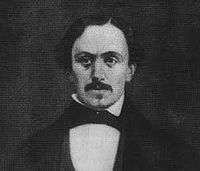Francisco González Bocanegra

Francisco González Bocanegra (January 8, 1824 – April 11, 1861) was a Mexican poet who wrote the lyrics of the Mexican National Anthem in 1853.[1]
He was born in San Luis Potosí, San Luis Potosí to Spanish soldier José María González Yáñez and Francisca Bocanegra y Villalpando, sister of the Foreign Relations Secretary under President Vicente Guerrero, José María Bocanegra. Despite his father being exempted because of being married to a Mexican, in 1827, his family moved to Spain after a law was enacted expelling all remaining Spanish citizens in the country. They settled in the port of Cádiz until the family returned to San Luis Potosí on December 28, 1836.
He died in 1861 and is buried in the Rotonda de los Hombres Ilustres (Rotunda of Illustrious Men) in Mexico City.
Writing of the Mexican national anthem
While Gonzalez was engaged to be married to Guadalupe González del Pino (Pili), there was a contest to compose the lyrics to the Mexican national anthem. Legend has it that Gonzalez did not wish to write lyrics for the competition, but Pili knew of his special talents and wanted him to enter. In order to do this, Pili lured Gonzalez into a room in her home and proceeded to lock Gonzalez inside. The only way Pili would let Gonzalez out of the room is if he writes a composition for the anthem competition. Gonzalez did and he was freed. Several days later, Gonzalez's entry for the anthem contest was declared the winner.
|
Coro: Mexicanos, al grito de guerra |
Chorus:[2] Mexicans, at the cry of war, |
|
Estrofa I: Ciña ¡oh Patria! tus sienes de oliva |
First Stanza: Let gird, oh Fatherland!, your brow with olive |
|
Estrofa V: ¡Guerra, guerra sin tregua al que intente |
Stanza V: War, war without quarter to any who dare |
|
Estrofa VI: Antes, patria, que inermes tus hijos |
Stanza VI: O, Fatherland, ere your children, defenseless |
|
Estrofa X: ¡Patria! ¡Patria! Tus hijos te juran |
Stanza X: Fatherland! Fatherland! your children swear to you |
See also
References
- ↑ Archived May 2, 2009 at the Wayback Machine
- ↑ President of the Republic—National Anthem for Kids. Retrieved March 15, 2006. Archived June 1, 2009 at the Wayback Machine
|